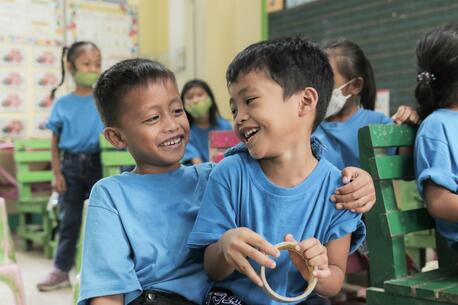
New Appropriations Act Signals Big Wins for Kids
U.S. lawmakers maintain support for UNICEF and other critical programs for children with the passage of the 2018 spending bill.
Great news for vulnerable children and their champions: the U.S. federal budget, signed into law last week, maintains critical support for UNICEF's humanitarian work around the world.
The $1.3 trillion spending bill includes a $132.5 million contribution to UNICEF — money that will go toward disaster relief, maternal and child health, nutrition and a range of other important programs.
The Consolidated Appropriations Act for the fiscal year 2018 signals Congress's continued support for the world's children in several other key ways.
For example, the law:
- Designates $1 million for The United States Agency for International Development (USAID) to fight maternal and neonatal tetanus — a cruel disease that is often fatal for newborns, yet entirely vaccine-preventable. Eliminating MNT has long been a priority of UNICEF and partner Kiwanis International, but this is the first year U.S. lawmakers appropriated funds specifically for it.
- Commits $2.5 million to addressing iodine deficiency disorders, another partnership goal of UNICEF and Kiwanis;
- Keeps up the Global Health Programs account, which supports polio eradication, malaria and HIV/AIDS prevention and other bipartisan efforts that UNICEF has long championed; and
- Recognizes our nation's need to respond to humanitarian crises, with robust funding for disaster assistance and Food for Peace, an office within USAID dedicated to reducing world hunger, food insecurity and malnutrition.
UNICEF USA's advocacy efforts on behalf of the legislation paid off in other ways as well. References to early childhood development (ECD) were added to nutrition and education sections, encouraging USAID to promote ECD as part of those programs. And in its committee report, the Senate directs the Secretary of State and USAID Administrator to work with UNICEF and the Special Olympics to expand protections and opportunities for children with disabilities.

On Advocacy Day, March 13, 425 UNICEF supporters held more than 200 meetings with Congressional offices to urge House and Senate lawmakers to put children first. © UNICEF USA
UNICEF receives no funding from the United Nations. It is supported entirely by the voluntary contributions of governments, nongovernmental organizations (NGOs), foundations, corporations and private individuals.
A big part of UNICEF USA's mission is to advocate for continued support for UNICEF and its efforts to save and protect children and families in need. We also generate additional funding support from our partners and donors. We thank all of our supporters for helping us reach our goals, year after year, on behalf of those children and families.
On March 13 — Advocacy Day — 425 UNICEF supporters held more than 200 meetings with Congressional offices to urge House and Senate lawmakers to put children first. We can't thank them enough.
And we can't thank you enough.
Top photo: Friends gather in Korohogo, southwest Côte d’Ivoire in December 2017. © UNICEF/UN0149883/Dejongh
HOW TO HELP
There are many ways to make a difference
War, famine, poverty, natural disasters — threats to the world's children keep coming. But UNICEF won't stop working to keep children healthy and safe.
UNICEF works in over 190 countries and territories — more places than any other children's organization. UNICEF has the world's largest humanitarian warehouse and, when disaster strikes, can get supplies almost anywhere within 72 hours. Constantly innovating, always advocating for a better world for children, UNICEF works to ensure that every child can grow up healthy, educated, protected and respected.
Would you like to help give all children the opportunity to reach their full potential? There are many ways to get involved.





